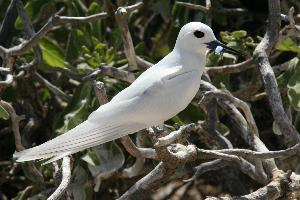
Animal description
The Black Noddy, scientifically known as Anous minutus, is a captivating seabird that belongs to the tern family Laridae. This species is distinguished by its sleek, dark plumage, which ranges from a sooty black to a deep charcoal grey, complemented by a slightly paler crown and forehead. Adult Black Noddies typically exhibit a striking white cap, which contrasts vividly with their darker feathers, creating a distinctive and elegant appearance. They have a slender, pointed bill that is sharply downturned, facilitating their fish-catching endeavors, and their eyes are dark, adding to their mystique.One of the most fascinating aspects of the Black Noddy is its size and build. They are medium-sized terns, with a body length ranging from 30 to 40 centimeters (12 to 16 inches) and a wingspan that extends approximately 70 centimeters (27 inches). Despite their relatively modest size, they are robust and agile fliers, capable of maneuvering with precision and grace, particularly during their foraging pursuits over the ocean's surface.
Black Noddies are highly sociable birds, often found in large colonies on tropical and subtropical islands across the world's oceans. They exhibit remarkable fidelity to their nesting sites, returning year after year to breed. Their nests are ingeniously constructed platforms made from twigs and foliage, which are usually situated in trees or on cliff faces, providing protection from potential predators.
The breeding behavior of the Black Noddy is a testament to their complex social structures. They form monogamous pairs, with both parents sharing the responsibilities of incubating the egg and feeding the chick. Their diet primarily consists of small fish and squid, which they skillfully snatch from the ocean's surface in a display of aerial acrobatics.
Communication among Black Noddies involves a repertoire of calls and body language, which plays a crucial role in maintaining the cohesion of their colonies and the pair bonds between mates. Their vocalizations, although not melodious, are an integral part of their social interactions, serving as alarms, mating calls, and as a means of maintaining contact with their partners and offspring.
One of the remarkable features of the Black Noddy is its adaptation to the marine environment. Their feathers are not only waterproof but also provide excellent insulation, enabling them to regulate their body temperature effectively. Moreover, their legs and feet are fully webbed, aiding in their swimming ability, although they are seldom seen swimming.
The Black Noddy's range is impressively vast, with populations found in the Pacific and Atlantic Oceans, as well as the Caribbean and parts of the Indian Ocean. Despite their widespread distribution, they are susceptible to threats such as habitat destruction, pollution, and the impacts of climate change, which could potentially disrupt their breeding sites and food availability.
In conclusion, the Black Noddy is a remarkable bird, both in terms of its physical attributes and its behaviors. Its elegant appearance, complex social structures, and impressive flying abilities make it a fascinating subject of study for ornithologists and bird enthusiasts alike. As with many marine species, the conservation of their habitats is crucial to ensuring their survival for future generations to marvel at and study.
Similar Animals
New photos of animals
Top 10 animals
- Dolphin gull (Leucophaeus scoresbii)
- Japanese macaque (Macaca fuscata)
- Stone loach (Barbatula barbatula)
- Greek tortoise (Testudo graeca)
- Galápagos tortoise (Geochelone nigra complex)
- Diana monkey (Cercopithecus diana)
- Russian tortoise (Testudo horsfieldii)
- Moustached guenon (Cercopithecus cephus)
- Galápagos penguin (Spheniscus mendiculus)
- Common flying dragon (Draco volans)


